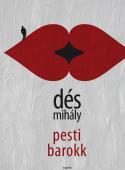
Budapest Baroque - powieść prosto z Węgier

Zapraszamy do zamawiania materiałów recenzenckich powieści Mihály'ego Désa.
It does not happen too often that leading publishing houses compete for the first novel of a Hungarian author, that the most prestigious literary magazines publish chapters of it and that there is an international interest towards it even before the book is published. It is doubly unlikely that such a promising beginner is in his sixties. And what is even more unusual is that the author returns to his mother tongue after being away from it for a quarter of a century.
However, this is precisely what happened with the novel Budapest Baroque, which is indeed the first novel of Mihály Dés, who truly is 63 years old and has actually been living abroad since 1986.
Not only are the circumstances of this debut unique, but also the book itself. That is something to which all primal readers (publishers, editors, critics...) agree. What they don’t quite agree on is what the book is all about, although unlike many modern novels, it is easy to describe the topic of this book.
The story takes place in Budapest in 1984. The main character is a loafing and flighty intellectual, planning to emigrate to the USA. The book recounts his love, intellectual, family, social and societal affairs, but its complex and eventful plot offers such a great variety of readings that one interprets it as a Don Juan parody – a humorous epic of desire and seduction; another as a chronicle of a generation, a tableau of an intellectual subculture - a lá Kerouac’s On the Road. There are some who see a post-modern historical novel in it; others a grotesque Bildungsroman, or even a metaphor of failure: a personal, a generational, and a societal failure; and there are yet others who perceive it as a pseudo roman á clef – but in the end no key fits in the lock, despite the reader being given a whole handful of keys.
Each chapter is written in a different genre or from a different angle. One may encounter a micro-realistic love scene, gallant episodes following the traditions of oriental tales, a family novel extract, a traditional short story, a joke anthology, psychoanalytic confession, reports (informer, editorial, company…), a theatrical comedy scene in a cemetery, sexual, family and public crime stories, a movie script, journalism, essay, diary, epistolary novel, apocalyptic vision…
The baroque counterpoints of complementary and refuting elements evoke an ambitious meta-literary exercise in style –and they do that for a good reason. But that is rather a hidden dimension of the novel. What the reader actually gets is a hilarious, overwhelming and touching book, in which the technical variation of each chapter mingles with unexpected turns of the screw and new approaches to the plot.
Dés' book has nothing to do with magical realism, yet it still recalls One Hundred Years of Solitude in a sense that a sophisticated narrative machine can also become a popular novel.
The main (or the most attractive) virtue of Budapest Baroque is that it can be simultaneously comic and dead serious, moving and cynical, obscene and poetic, manifestly sensual and ironically intellectual...
The humour of the book – based on the main character's voice – is reminiscent of the neurotic humour of Woody Allen, Philip Roth and Italo Svevo, only combined with Rabelaisian hedonism and vitality. And if we approach it from the ‘failure’ motif, we find a striking, Dionysian failure.
“Never has any generation on Earth had such a good time feeling bad as we did”, says one of the characters in Budapest Baroque, and undoubtedly the bizarre duality of anguish and vitality is what best characterizes this remarkable book.
REVIEWS:
Budapest house parties in the mid-eighties, love affairs, conquests, betrayals, myths of friendship, dirty laundry of a middle class family... Like a literary costume ball, Dés’ brilliant first novel is a thrilling encounter of diverse genres. The wit of the book also runs on various levels: heavy humor, ironic quotes, political jokes, grotesque scenes and literary parodies. As it is not a generational novel, readers of any age can enjoy it!
János Szegő, editor of the publishing house
Dolce vita behind the Iron Curtain… Love affairs, friendships, betrayals… Vibrant storytelling, diverse styles, intense characters, lives and destinies in Budapest of the eighties. Highly entertaining both for those who experienced all that and who just heard about those times.
ÉvaKarádi, Hungarian Lettre International(quarterly)
An excellent postmodern development and historical novel.
FerencMező, Mozgóvilág (monthly)
Brilliantly built novel based on unexpected counterpoints about our collective myths embodied in individual destinies. Impossible to put down!
Kalman Barsy, Argentine - Puerto Rican writer
The most humorous and sensual contemporary novel I have ever read.
EszterVadnai, publishing house reader
Cutting profane content playing with a limitless structure. A story starting with an epiphany and - through plenty of absorbing picaresque adventures – ending in an Apocalypse... The narrator fails and his story represents the failure of a generation. But the story of this failure turns out to be much more than a roman à clef: a great book that forever captures a state of being.
ImreBarna, director of Európa publishing house
**********
Osoby zainteresowane tytułem prosimy o kontakt z Justyną Czechowską pod adresem justyna@literatura.com.pl
<-wroc Tweet
